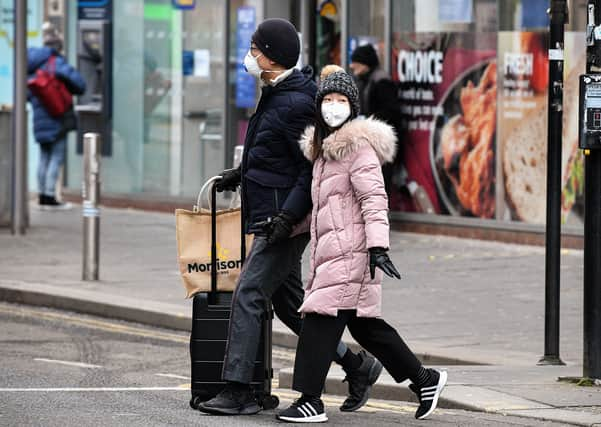What coronavirus denial can teach us about climate change – Andras Ferencz


“Climate change needs to hire coronavirus’s publicist.” You may have seen the sardonic statement.
It cropped up on the internet as soon as Covid-19 began to tighten its grip on the globe. It suggests we treat climate change with the same level of urgency that we afford the viral pandemic.
Advertisement
Hide AdAdvertisement
Hide AdIn some ways, the phrase seems a bit unseemly. Publicity brings commercial pursuits to mind, which feels inappropriate at a time when so many people are suffering and dying.
But glib as it may sound, the statement rings true. Climate change and coronavirus are strikingly similar and intertwined in more ways than one.
Both are existential threats bound by the laws of nature. Just as the US President was unable to talk the virus into submission, climate change doesn’t care about our dreams, preferences or weekly schedule.
Both existential threats also happen to be existing threats. In other words, we’ve not managed to prevent them. Rather, we’re responding to them with varying degrees of urgency and success after they’ve begun to unfold.
This similarity is largely because our species hasn’t evolved to effectively deal with future problems.
Nobel Prize-winning psychologist Daniel Kahneman explains that “if you were to design a problem that the mind is not equipped to deal with, climate change would fit the bill. It’s distant. It’s abstract.”
Kahneman adds that if a comet were hurtling towards us – an admittedly more immediate threat than climate change – then we’d mobilise within a day.
It seems, however, that Covid-19 wasn’t hurtling towards us fast enough. Much of the world had a month or two of warning signs and still didn’t take adequate measures. We should have listened to Li Wenliang, the Chinese whistleblower doctor.
Advertisement
Hide AdAdvertisement
Hide AdSimilarly, most nations are still dragging their feet on a sustainable energy transition, despite decades of scientific warnings.
The result is that most nations struggle to flatten the pandemic curve, just as we’re struggling to put a dent in the world’s emissions curve.
This tendency to react to threats – rather than prevent them – highlights other parallels as well. Problems of overwhelming proportions tend to elicit denial in people, a knee-jerk reaction manifested in prescriptive steps. “First, one denies the problem, then one denies its severity, and then one says it is too difficult or expensive to fix, and/or that the proposed solution threatens our freedom,” says Naomi Oreskes, a history of science professor at Harvard University.
Trump’s changing stance
Decades of climate denial fits the narrative perfectly. Despite warnings – even within the fossil fuel industry itself – resource extraction continued. Misinformation campaigns, op-eds and vanity research projects sowed doubt and downplayed the problem’s severity. Nations argued that a rapid low-carbon transition would wreck their economies.
As for the coronavirus, the playbook is much the same. Only it played out much faster.
The US White House, for example, ignored early intelligence reports in January. Publicly, the President vowed there was no real threat. By February, the presence of the disease was undeniable. In response, the President downplayed the pandemic’s severity, telling people the virus would miraculously disappear one day. The virus kept spreading.
By mid-March, the President professed he “felt it was a pandemic long before it was called a pandemic”. A week later, the focus shifted to the financial costs of dealing with the threat. “We cannot let the cure be worse than the problem itself,” Trump told reporters.
Deny the problem. Downplay its severity. Say the solution is too expensive.
Advertisement
Hide AdAdvertisement
Hide AdThe US, of course, is not an exception. The Brazilian President, too, thinks the threat is exaggerated. Turkmenistan allegedly banned the use of the word ‘coronavirus’. There are others too.
But denial is not the only challenge in how our species responds. Adaptation, the preferable answer to existing threats, is also problematic. This is because adaptation is inherently unjust.
Climate journalist David Wallace-Wells explains that adaptation measures “represent a choice about who to protect and who to expose”. He says that “there are no good options, only ways of prioritising particular catastrophes, and communities, over others”.
Amplify our worst instincts
In the case of climate change, populations least responsible for causing global warming – often poor and lacking resources – are the most exposed to warming’s worst effects. Covid-19 highlights inequities too.
Poorer people tend to live in areas with higher levels of air pollution. As the European Public Health Alliance recently reported, people with conditions caused by severe air pollution are much less likely to recover from coronavirus. Not to mention that people in poor socio-economic environments usually tend to have limited access to quality healthcare.
So, yes, at the end of the day, climate change could certainly benefit from hiring coronavirus’s figurative publicist. But that’s only true once the threat has already materialised. The reality is that reactive measures will always amplify our worst instincts and expose inequities within our societies.
Prevention is what we need. Fortunately, it’s not too late. Some of the worst effects of climate change are preventable – and so are future pandemics.
Scientists and health organisation have suggested for years that climate change-induced warming and population migrations will increase the frequency and severity of global pandemics.
Advertisement
Hide AdAdvertisement
Hide AdFix the former and you’ll help fix the latter. How to do that? As it happens, one of the rare positives of the coronavirus pandemic is how it’s showing us what to fix and how to prepare.
The virus exposed our vulnerabilities to existential threats. The obvious response now is to build societies that are more equitable and better equipped to respond to early warning signs.
Lessons of quarantine
If scientists say it’s time to build stockpiles of protective gear, we should do it. If engineers tell us to invest into battery storage systems, off we go. A federal green job guarantee to boost the economy? What are we waiting for?
As Andrew Kassoy, co-founder of the business sustainability certification scheme B-Lab put it, “If we get to the other side of this and we end up with the same system that we started with, then we won’t have learned much.”
Covid-19 has shown that changing societal norms and human behaviour on scale is possible.
The more priviliged among us have already seen that office work, gym workouts, professional development and psychotherapy can all carry on in cyberspace.
Don’t get me wrong, a global pandemic is surely not the way to fix climate change and other societal problems.
Yes, it’s easy to get excited about the drop in electricity demand in locked down economies. Or celebrate plummeting oil demand. But these are only temporary.
Advertisement
Hide AdAdvertisement
Hide AdWhat shouldn’t be temporary are the lessons we take forward as we come out of quarantine. So, let’s not use ‘publicists’ to fix our problems. Prevention is a better option.
Andras Ferencz is a sustainability consultant at AlwaysBeContent
Comments
Want to join the conversation? Please or to comment on this article.
